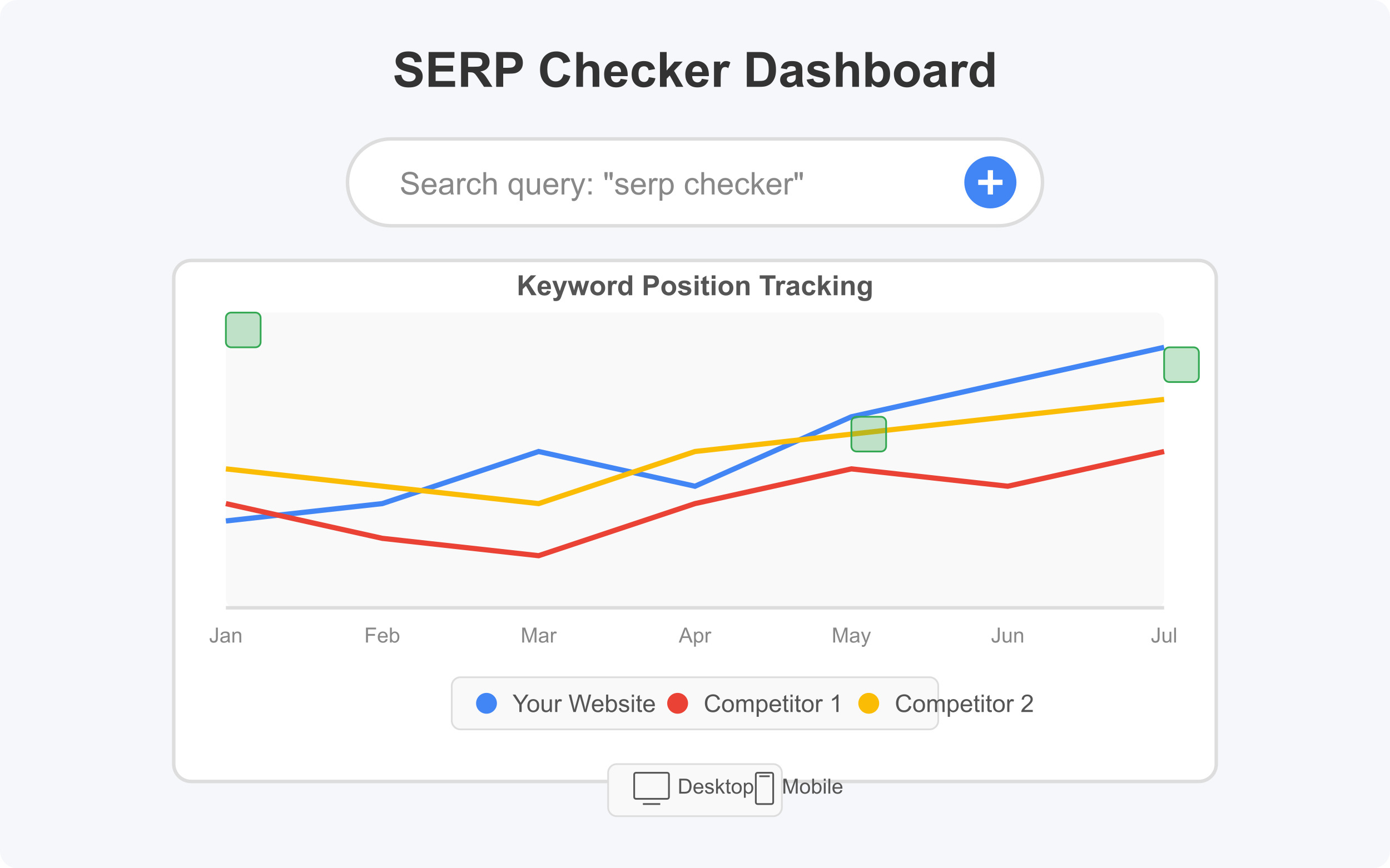
SERP Checker: The Complete Guide (2025) Introduction: Understanding SERP Checkers
Search Engine Results Pages (SERPs) are the battleground where websites compete for visibility. A SERP checker is a powerful tool that allows you to monitor your website's position in search engine rankings, track competitors, and gain valuable insights to improve your SEO strategy. In today's competitive digital landscape, understanding and leveraging SERP data is essential for online success.
What is a SERP Checker?
A SERP checker is a specialized tool that tracks and reports the position of a website in search engine results for specific keywords. These tools simulate searches from different locations, devices, and search engines to provide accurate ranking data that helps SEO professionals and website owners make data-driven decisions.
Key Functions of SERP Checkers:
- Rank Tracking: Monitor your website's position for target keywords over time
- Competitor Analysis: Identify who ranks above you and analyze their strategies
- SERP Feature Monitoring: Track rich snippets, featured snippets, knowledge panels, and other SERP features
- Local SEO Tracking: Check rankings across different geographic locations
Why SERP Checkers Are Essential for SEO Success
Real-time Performance Monitoring
SERP checkers provide real-time insights into your SEO performance. Instead of waiting for monthly reports or Google Search Console data, you can instantly check how recent changes have affected your rankings. This immediate feedback loop allows for agile strategy adjustments and quicker optimization.
Competitive Intelligence
Understanding your competition is crucial for SEO success. SERP checkers reveal not just who ranks above you, but often what elements contribute to their success. By analyzing SERP features, content types, and ranking patterns, you can identify gaps in your strategy and opportunities for improvement.
Strategic Keyword Prioritization
Not all keywords deliver the same value. SERP checkers help you identify which keywords drive traffic, conversions, and revenue. By tracking performance across your keyword portfolio, you can allocate resources more effectively and focus on terms with the highest potential ROI.
How to Choose the Right SERP Checker
With numerous tools available, selecting the right SERP checker requires careful consideration of several factors:
Accuracy and Freshness of Data
The value of a SERP checker depends entirely on the accuracy of its data. Look for tools that:
- Update data frequently (daily is ideal)
- Support your target search engines (Google, Bing, Yahoo, etc.)
- Provide device-specific results (mobile vs. desktop)
- Offer location-specific tracking capabilities
Depth of Analysis
Basic rank tracking is just the starting point. Advanced SERP checkers offer:
- SERP feature tracking
- Click-through rate (CTR) estimates
- Search volume data
- Keyword difficulty scores
- Competitive analysis tools
Reporting and Integration Capabilities
Effective SERP checkers should integrate with your broader SEO toolkit:
- Custom report generation
- API access for data integration
- Alerts and notifications for significant ranking changes
- White-label reporting options for agencies
Top SERP Checker Tools for 2025
Several tools stand out in the current market, each with unique strengths:
Comprehensive SERP Tracking Solutions
Ahrefs Rank Tracker
- Strengths: Comprehensive keyword database, competitor analysis, detailed SERP feature tracking
- Best for: Agencies and in-house SEO teams needing depth and accuracy
SEMrush Position Tracking
- Strengths: Local SEO features, share of voice metrics, mobile vs. desktop comparison
- Best for: Businesses targeting multiple geographic regions
Moz Pro Rank Tracker
- Strengths: User-friendly interface, historical data visualization, page optimization suggestions
- Best for: SEO beginners and small businesses
Specialized and Budget Options
Serpstat Rank Tracker
- Strengths: Affordable pricing, API access, bulk checking capabilities
- Best for: Growing businesses with budget constraints
SERPWatcher by Mangools
- Strengths: Intuitive interface, dominance index metric, shareable reports
- Best for: Freelancers and small agencies
Advanced SERP Checker Strategies
Segmented Keyword Tracking
Organize your keywords into logical groups based on:
- Buyer journey stages (awareness, consideration, decision)
- Product/service categories
- Content types (blog posts, product pages, landing pages)
- User intent (informational, commercial, transactional)
This segmentation provides more actionable insights than tracking a single consolidated list.
SERP Feature Optimization
Modern SERPs contain numerous features beyond the traditional blue links:
- Featured snippets
- People Also Ask boxes
- Local packs
- Knowledge panels
- Image carousels
- Video results
Advanced SERP checkers help you identify which features appear for your target keywords, allowing you to optimize content specifically for these opportunities.
Competitor Gap Analysis
Use SERP checkers to conduct regular competitor gap analyses:
- Identify keywords where competitors rank but you don't
- Analyze the top-ranking pages for these keywords
- Determine content and technical factors contributing to their success
- Develop strategies to create more comprehensive, valuable content
Interpreting SERP Data Effectively
Distinguishing Between Ranking Fluctuations and Trends
Not every ranking change requires action. SERP checkers with historical data help you distinguish between:
- Normal algorithm fluctuations
- Seasonal variations
- Actual ranking trends requiring attention
Correlating Ranking Changes with Website Updates
When you make changes to your website, SERP checkers help you understand the impact:
- Establish pre-change ranking baselines
- Implement changes to content, structure, or technical elements
- Monitor ranking movements in the following days and weeks
- Document successful approaches for future optimization
Identifying Algorithm Updates
Sudden ranking changes across multiple keywords often indicate algorithm updates. Advanced SERP checkers can help you:
- Detect patterns in ranking shifts
- Compare your experiences with industry reports
- Understand which page types or content categories were most affected
Step-by-Step Guide: Conducting a SERP Analysis
1. Baseline Assessment
Begin with a comprehensive audit of your current rankings:
- Export your full keyword list from Google Search Console or your analytics platform
- Upload these keywords to your SERP checker
- Establish current ranking positions
- Note SERP features present for each keyword
2. Competitor Identification
For each primary keyword:
- Record the top 10 ranking domains
- Identify consistent competitors appearing across multiple keywords
- Select 3-5 primary competitors for in-depth analysis
3. Content Gap Analysis
Using your SERP checker's competitive analysis features:
- Identify keywords your competitors rank for that you don't
- Prioritize these keywords based on search volume, difficulty, and relevance
- Create a content development plan targeting these opportunities
4. SERP Feature Optimization Plan
For your highest-value keywords:
- Identify which SERP features appear consistently
- Develop content specifically formatted to capture these features
- For featured snippets, create concise definitions, lists, or tables
- For local packs, ensure your Google Business Profile is optimized
5. Ongoing Monitoring System
Establish a routine monitoring schedule:
- Daily checks for your most valuable keywords
- Weekly reviews of overall portfolio performance
- Monthly comprehensive analysis and strategy adjustments
Common SERP Checker Mistakes to Avoid
Focusing Solely on Ranking Positions
While positions matter, they're not the only important metric. Avoid the tunnel vision of obsessing over ranking changes without considering:
- Click-through rates
- Conversion performance
- Overall organic traffic
- SERP feature presence
Neglecting Mobile Rankings
With mobile-first indexing, mobile rankings often differ significantly from desktop. Always check both to get a complete picture of your performance.
Ignoring Local SERP Variations
Rankings can vary dramatically across locations. If you serve specific geographic areas, track rankings from those precise locations rather than relying on national averages.
Over-reacting to Algorithm Fluctuations
Google makes thousands of small algorithm adjustments yearly. Not every ranking shift requires immediate action. Look for persistent trends rather than daily fluctuations.
Future of SERP Checkers: AI and Predictive Analytics
The next generation of SERP checkers is incorporating artificial intelligence to provide:
- Predictive ranking analysis
- Automated content optimization recommendations
- Natural language processing for intent matching
- Competitor strategy forecasting
These advanced features will transform SERP checkers from passive monitoring tools into proactive strategic advisors.
Conclusion: Leveraging SERP Checkers for Sustainable SEO Success
SERP checkers have evolved from simple rank tracking tools to comprehensive SEO intelligence platforms. By leveraging these tools effectively, you can:
- Make data-driven optimization decisions
- Identify emerging opportunities before competitors
- Understand the impact of algorithm updates
- Track the ROI of your SEO investments
In today's competitive search landscape, regular SERP analysis isn't optional—it's essential for maintaining and improving your online visibility. By implementing the strategies outlined in this guide, you'll be well-positioned to outrank competitors and capture valuable organic traffic.
FAQs About SERP Checkers
How often should I check my search rankings?
While daily monitoring is available, most businesses benefit from weekly comprehensive reviews, with more frequent checks following significant website changes or suspected algorithm updates.
Are free SERP checkers accurate?
Free SERP checkers typically offer limited queries and less frequent updates. They can provide basic insights but lack the depth and accuracy needed for professional SEO management.
Can SERP checkers affect my Google rankings?
No, using a SERP checker won't directly impact your rankings. Quality tools use methods that don't trigger Google's automated systems.
How do SERP checkers differ from Google Search Console?
SERP checkers provide more frequent updates, competitor insights, and historical data compared to Search Console. However, Search Console offers unique data directly from Google that complements SERP checker information.
What's the difference between a SERP checker and a rank tracker?
All rank trackers are SERP checkers, but not all SERP checkers are just rank trackers. Advanced SERP checkers provide additional insights into SERP features, competitor analysis, and search intent that basic rank trackers may not offer.
